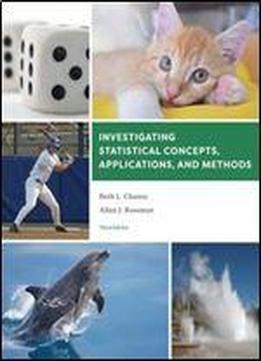
Investigating Statistical Concepts, Applications, And Methods, 3rd Edition
by Beth L. Chance /
2018 / English / PDF
7.1 MB Download
TO THE STUDENT
Statistics is a mathematical science.
Although this is a very short sentence, perhaps a self-evident one, and certainly one of the shortest that
you will find in this book, we want to draw your attention to several things about it:
? We use the singular “is” and not the plural “are.” It is certainly grammatically correct and more
common usage to say “statistics are…”, but that use of the term refers to statistics as numerical values.
In this sentence we mean statistics as a field of study, one that has its own concepts and techniques,
and one that can be exciting to study and practice.
? We use “mathematical” as an adjective. Statistics certainly makes use of much mathematics, but it is a
separate discipline and not a branch of mathematics. Many, perhaps most, of the concepts and
methods in statistics are mathematical in nature, but there are also many that do not involve
mathematics. You will see an example of this early in the book as you study the difference between
observational studies and controlled experiments. You will find that even in cases where the
mathematical aspects of two situations may be identical, the scope of one’s conclusions depends
crucially on how the data were collected, a statistical rather than a mathematical consideration.
? We use the noun “science.” Statistics is the science of gaining insight from data. Data are (notice the
plural here) pieces of information (often but not always numerical) gathered on people or objects or
processes. The science of statistics involves all aspects of inquiry about data. Well-designed studies
begin with a research question or hypothesis, devise a plan for collecting data to address that issue,
proceed to gather the data and analyze them, and then often make inferences about how the findings
generalize beyond the particular group being studied. Statistics concerns itself with all phases of this
process and therefore encompasses the scientific method.
In these materials, our goal is to introduce you to this practice of statistics, to help you think about the
applications of statistics and to study the mathematical underpinnings of the statistical methods. Most of
all, we hope you will find fun and engaging examples. Statistics is a vitally important subject, and also fun
to study and practice, largely because it brings you into contact with all kinds of interesting questions. You
will analyze data from medical studies, legal cases, psychology experiments, sociological studies, and many
other contexts. To paraphrase the late statistician John Tukey, “the best thing about statistics is that it
allows you to play in everyone else’s backyard.” You never know what you might learn in a statistics class!











